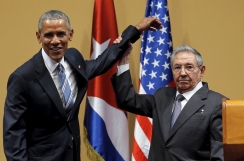
In 2014, the formerly hermit nation of Cuba once more came into the world's attention when it decided to resume normalising its relations with the United States. Almost two years later, Cuba is once again drawing attention, but this time, due to its growing Christian population.
Recognising this, a number of Christian organisations from the United States, such as The Luis Palau Bible Institute, the International Bible Society, the Luis Palau Association and Logos Christian University, plan to help spread God's words in Cuba even more, by offer ministry training to scores of local pastors at a gathering this November.
Dr. Carlos Barbieri, director of The Luis Palau Bible Institute, told Deseret News that this gathering will be the first of its kind for the region. This is possible now because of the growing religious freedom in Cuba, where Christianity has "grown in the shadows for many years."
"Many of the churches and church leaders were born in the trenches and underground," Barbieri said. "They are bold and persistent. They are undoubtedly a living example for others, committed to the scriptures and passionate about the Lord."
He further explained that even before this momentous event four months from now, his group has started helping some pastors from Cuba to make them more equipped for their task of spreading God's Words.
"We have been training a very small group of Cuban leaders who can access our materials and training online. It has been a very small amount — no more than 40 pastors and leaders throughout the entire nation," Barbieri said, while admitting that this mission in Cuba is not an easy task.
The gathering in November is expected to attract over 200 Christian pastors from across Cuba. Barbieri said his group and other Christian organisations from the US decided to conduct an actual ministry training in Cuba after attempts to provide the same assistance before online failed due to limited internet access in the nation.
"We have attempted many times to send DVDs, old-school computer disks, or even hard drives to help with training," he said. "None of them were very effective."















